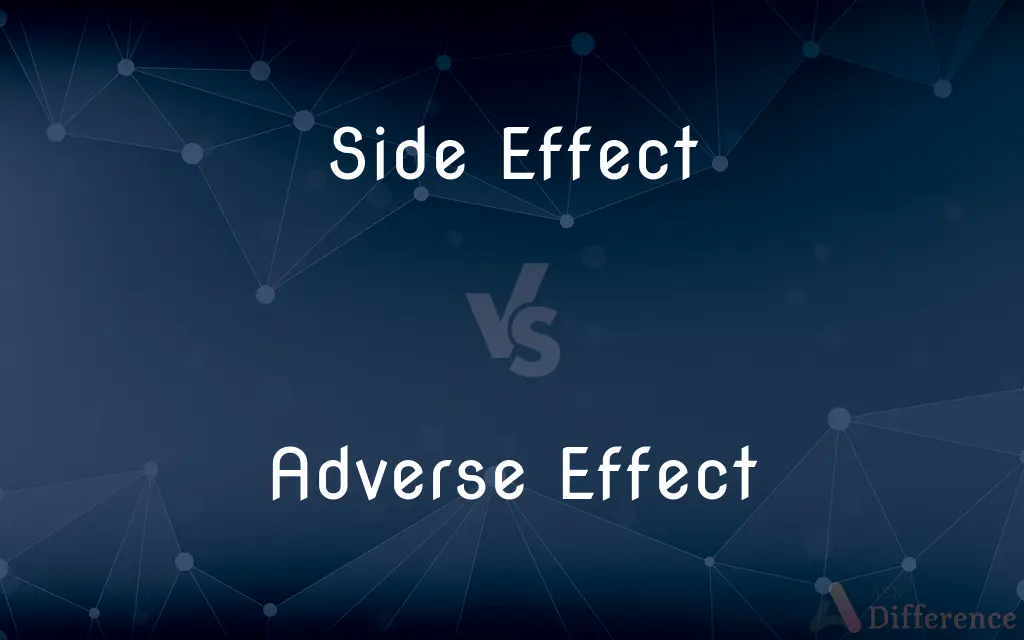Side Effect vs. Adverse Effect — What's the Difference?
By Tayyaba Rehman — Published on December 23, 2023
A Side Effect is an unintended consequence of a drug or treatment, not necessarily harmful. An Adverse Effect is a harmful or undesired reaction resulting from the intervention.

Difference Between Side Effect and Adverse Effect
Table of Contents
ADVERTISEMENT
Key Differences
A Side Effect refers to any reaction or outcome, expected or unexpected, resulting from a medical treatment or drug. These effects can be either beneficial, neutral, or harmful. For instance, a person taking medication might experience drowsiness, which is a side effect of the drug. On the other hand, an Adverse Effect is specifically a harmful or undesirable reaction which occurs following the drug administration or treatment.
Every drug or treatment may have a Side Effect. These effects are not necessarily negative; they might even be beneficial in some cases. For example, a drug intended to treat depression might also lead to weight loss, making the latter a side effect. Conversely, Adverse Effects are always undesirable. They represent complications or negative reactions that can impact a patient's health, like an allergic reaction to a specific drug component.
In the realm of medical treatments and pharmaceuticals, the term Side Effect is broad. It encompasses any secondary effect, whether it's anticipated or not. For instance, an individual might experience dry mouth as a side effect of antihistamines. Adverse Effect, by contrast, zeroes in on those secondary effects that are harmful. These effects could range from mild issues like minor rashes to severe complications, such as organ damage.
In clinical trials, researchers always look out for Side Effects to understand the full range of outcomes a drug might produce. It's common to find side effects listed on medication labels to inform users. Adverse Effects, given their harmful nature, are of significant concern. They are scrutinized closely, and if severe, can lead to the withdrawal of the drug from the market.
Both terms, Side Effect and Adverse Effect, play crucial roles in understanding the implications of medical treatments. While all adverse effects are side effects, not all side effects are adverse effects.
ADVERTISEMENT
Comparison Chart
Definition
Any secondary reaction or outcome from a drug or treatment.
A harmful or undesirable reaction from an intervention.
Nature
Can be positive, neutral, or negative.
Always negative or harmful.
Context
Broad term encompassing all secondary effects.
Specifically refers to detrimental or harmful outcomes.
Significance in trials
Noted to understand a drug's full range of outcomes.
Scrutinized closely due to potential harm to patients.
Examples
Weight loss from a depression drug.
Allergic reaction or organ damage from a drug.
Compare with Definitions
Side Effect
A secondary reaction from a medical intervention.
The medication caused a side effect of dizziness.
Adverse Effect
A risky or damaging response to a drug or treatment.
The new drug had multiple adverse effects, including blurred vision and dizziness.
Side Effect
A non-primary result from medication or procedure.
Hair loss was a known side effect of the chemotherapy.
Adverse Effect
A negative, undesirable reaction to an intervention.
The vaccine had an adverse effect, causing an allergic reaction in some individuals.
Side Effect
Any response to a drug other than the primary effect.
Some patients reported fatigue as a side effect of the treatment.
Adverse Effect
A detrimental consequence of a therapeutic process.
There was an adverse effect of kidney damage due to prolonged medication usage.
Side Effect
An unexpected consequence of a therapeutic intervention.
A surprising side effect of the drug was improved skin complexion.
Adverse Effect
A harmful outcome from a medical treatment.
The patient experienced an adverse effect of severe nausea from the drug.
Side Effect
An additional outcome apart from the intended result.
One side effect of the painkiller was increased alertness.
Adverse Effect
An injurious result from medical intervention.
One of the adverse effects of the surgery was chronic pain at the site.
Side Effect
Alternative spelling of side effect
Side Effect
To alter as a side effect.
Common Curiosities
How does an Adverse Effect differ from a Side Effect?
While a Side Effect can be beneficial, neutral, or harmful, an Adverse Effect is specifically harmful or undesirable.
What is a Side Effect?
A Side Effect is any secondary outcome or reaction resulting from a medical treatment or drug.
Are all Adverse Effects also Side Effects?
Yes, all Adverse Effects are a subset of Side Effects, but not all Side Effects are adverse.
Can a Side Effect be positive?
Yes, a Side Effect can be positive, neutral, or negative, depending on the specific reaction.
Do all patients experience the same Side Effects?
No, Side Effects can vary based on individual factors like genetics, health conditions, and other medications.
How can one minimize the risk of Adverse Effects?
Following prescription guidelines, informing doctors of all medications, and regular monitoring can minimize risks.
Are Adverse Effects always serious?
Adverse Effects are harmful, but they can range from mild to severe complications.
Can Adverse Effects appear after a long time?
Yes, some Adverse Effects may take time to manifest and can appear long after the treatment has started.
Can a drug have multiple Side Effects?
Yes, drugs can have multiple Side Effects, varying among individuals.
Are Adverse Effects common?
Adverse Effects can vary in frequency; some are rare, while others are more common, depending on the drug or treatment.
Is the primary intention of a drug considered a Side Effect?
No, the primary intended outcome of a drug is not a Side Effect; only secondary responses are.
How are Adverse Effects identified?
Adverse Effects are identified through clinical trials, patient reports, and post-market surveillance.
Why are Side Effects important to understand?
Understanding Side Effects helps patients and doctors make informed decisions about treatments.
Can a known Side Effect become an Adverse Effect?
If a previously recognized Side Effect is determined to be harmful, it can be classified as an Adverse Effect.
Are Side Effects always listed on drug labels?
Common and significant Side Effects are usually listed, but not all potential Side Effects may be included.
Share Your Discovery

Previous Comparison
Appointment Letters vs. Offer Letters
Next Comparison
Equity Shares vs. Preference SharesAuthor Spotlight
Written by
Tayyaba RehmanTayyaba Rehman is a distinguished writer, currently serving as a primary contributor to askdifference.com. As a researcher in semantics and etymology, Tayyaba's passion for the complexity of languages and their distinctions has found a perfect home on the platform. Tayyaba delves into the intricacies of language, distinguishing between commonly confused words and phrases, thereby providing clarity for readers worldwide.












































